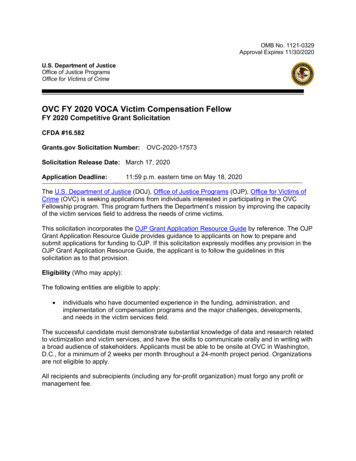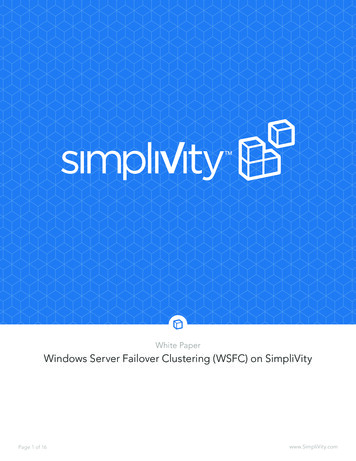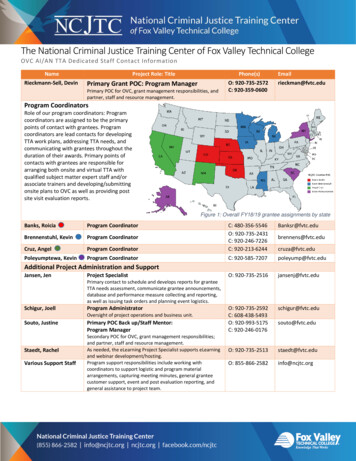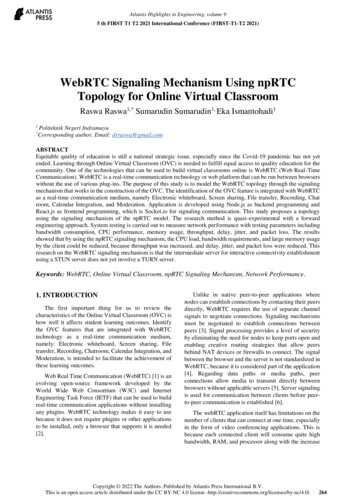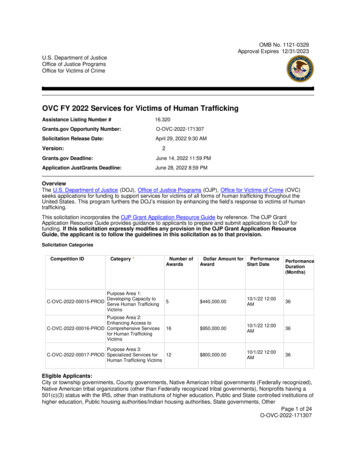
Transcription
OMB No. 1121-0329Approval Expires 12/31/2023U.S. Department of JusticeOffice of Justice ProgramsOffice for Victims of CrimeOVC FY 2022 Services for Victims of Human TraffickingAssistance Listing Number #16.320Grants.gov Opportunity Number:O-OVC-2022-171307Solicitation Release Date:April 29, 2022 9:30 AMVersion:2Grants.gov Deadline:June 14, 2022 11:59 PMApplication JustGrants Deadline:June 28, 2022 8:59 PMOverviewThe U.S. Department of Justice (DOJ), Office of Justice Programs (OJP), Office for Victims of Crime (OVC)seeks applications for funding to support services for victims of all forms of human trafficking throughout theUnited States. This program furthers the DOJ’s mission by enhancing the field’s response to victims of humantrafficking.This solicitation incorporates the OJP Grant Application Resource Guide by reference. The OJP GrantApplication Resource Guide provides guidance to applicants to prepare and submit applications to OJP forfunding. If this solicitation expressly modifies any provision in the OJP Grant Application ResourceGuide, the applicant is to follow the guidelines in this solicitation as to that provision.Solicitation CategoriesCompetition IDCategory *Number ofAwardsDollar Amount for PerformanceAwardStart DatePurpose Area 1:Developing Capacity toC-OVC-2022-00015-PRODServe Human TraffickingVictims5 440,000.0010/1/22 12:00AM36Purpose Area 2:Enhancing Access toC-OVC-2022-00016-PROD Comprehensive Servicesfor Human TraffickingVictims16 950,000.0010/1/22 12:00AM36Purpose Area 3:C-OVC-2022-00017-PROD Specialized Services for12Human Trafficking Victims 800,000.0010/1/22 12:00AM36PerformanceDuration(Months)Eligible Applicants:City or township governments, County governments, Native American tribal governments (Federally recognized),Native American tribal organizations (other than Federally recognized tribal governments), Nonprofits having a501(c)(3) status with the IRS, other than institutions of higher education, Public and State controlled institutions ofhigher education, Public housing authorities/Indian housing authorities, State governments, OtherPage 1 of 24O-OVC-2022-171307
OtherFor purposes of this solicitation, “state” means any state of the United States, the District of Columbia, theCommonwealth of Puerto Rico, the Virgin Islands, Guam, American Samoa, and the Commonwealth of theNorthern Mariana Islands.To advance Executive Order 13929 Safe Policing for Safe Communities, the Attorney General determined that allstate, local, and university or college law enforcement agencies must be certified by an approved independentcredentialing body or have started the certification process to be eligible for FY 2022 DOJ discretionary grantfunding. To become certified, the law enforcement agency must meet two mandatory conditions: (1) the agency’suse-of- force policies adhere to all applicable federal, state, and local laws; and (2) the agency’s use-of-forcepolicies prohibit chokeholds except in situations where use of deadly force is allowed by law. The certificationrequirement also applies to law enforcement agencies receiving DOJ discretionary grant funding through asubaward. For detailed information on this certification requirement, please visithttps://cops.usdoj.gov/SafePolicingEO to access the Standards for Certification on Safe Policing for SafeCommunities, the Implementation Fact Sheet, and the List of Designated Independent Credentialing Bodies.All recipients and subrecipients (including any for-profit organization) must forgo any profit or management fee.OVC will consider applications under which two or more entities would carry out the federal award; however, onlyone entity may be the applicant. Any others must be proposed as subrecipients (subgrantees). For additionalinformation on subawards, see the OJP Grant Application Resource Guide.Entities should apply to the relevant Purpose Area(s) based on proposed projects. OVC will not make multipleawards to entities proposing to serve the same geographic area/population under more than one Purpose Area.However, national or regional entities with multiple program locations may receive multiple awards under one ormore Purpose Areas for proposed projects with distinct programmatic locations.OVC may elect to fund applications submitted under this FY 2022 solicitation in future fiscal years, dependent on,among other considerations, the merit of the applications and the availability of appropriations.Contact InformationFor technical assistance with submitting the Application for Federal Assistance standard form (SF)-424 and aDisclosure of Lobbying Activities form (SF-LLL) in Grants.gov, contact the Grants.gov Customer Support Hotlineat 800-518-4726, 606-545-5035, Grants.gov Customer Support, or support@grants.gov. The Grants.govSupport Hotline operates 24 hours a day, 7 days a week, except on federal holidays.For technical assistance with submitting the full application in DOJ’s Justice Grants System (JustGrants),contact the JustGrants Service Desk at 833-872-5175 or JustGrants.Support@usdoj.gov. The JustGrantsService Desk operates 5 a.m. to 9 p.m. eastern time Monday-Friday and 9 a.m. to 5 p.m. Saturday, Sunday, andFederal holidays.For assistance with any other requirements of this solicitation, contact the OJP Response Center by telephone at800-851-3420 or TTY: at 301-240-6310 (hearing impaired only), or by email at grants@ncjrs.gov. The OJPResponse Center hours of operation are 10:00 a.m. to 6:00 p.m. eastern time Monday-Friday, and 10:00 a.m. to8:00 p.m. on the solicitation closing date.Submission InformationApplications will be submitted to DOJ in two steps:Step 1: The applicant must submit by the Grants.gov deadline the required Application for Federal Assistancestandard form (SF-424) and a Disclosure of Lobbying Activities (SF-LLL) form when they register in Grants.govat https://www.grants.gov/web/grants/register.html. To register in Grants.gov, the applicant will need to ensurethat its System for Award Management (SAM) registration is current.Step 2: The applicant must then submit the full application, including attachments, in JustGrants atPage 2 of 24O-OVC-2022-171307
JustGrants.usdoj.gov. To be considered timely, the full application must be submitted in JustGrants by theJustGrants application deadline. OJP encourages applicants to review the “How to Apply” section in the OJPGrant Application Resource Guide and the JustGrants website for more information, resources, and training.Pre-Application WebinarOVC will conduct one pre-application webinar during which OVC staff will review the solicitation requirements andconduct a question and answer session with interested potential applicants. Participation is optional. When thewebinar has been scheduled, the details and registration information will be available e 3 of 24O-OVC-2022-171307
ContentsContact InformationProgram DescriptionOverviewStatutory AuthoritySpecific InformationGoals, Objectives, Deliverables, and TimelineEvidence-Based Programs or PracticesInformation Regarding Potential Evaluation of Programs and ActivitiesOJP Priority AreasFederal Award InformationAwards, Amounts and DurationsContinuation Funding IntentAvailability of FundsTypes of AwardsFinancial Management and System of Internal ControlsCost Sharing or Matching RequirementPre-agreement Costs (also known as Pre-award Costs)Limitation on Use of Award Funds for Employee Compensation: WaiverPrior Approval, Planning, and Reporting of Conference/Meeting/Training CostsCosts Associated with Language Assistance (if applicable)Eligibility InformationApplication and Submission InformationInformation to Complete the Application for Federal Assistance (SF-424)Standard Applicant Information (JustGrants 424 and General Agency Information)Proposal AbstractProposal NarrativeGoals, Objectives, Deliverables, and TimelineBudget and Associated DocumentationBudget Worksheet and Budget Narrative (Web-based Form)Indirect Cost Rate Agreement (if applicable)Financial Management Questionnaire (including applicant disclosure of high-risk status)Disclosure of Process Related to Executive CompensationTraining Plan (if applicable)Memoranda of Understanding (MOUs) and Other Supportive DocumentsAdditional Application ComponentsCurriculum Vitae or ResumesTribal Authorizing ResolutionResearch and Evaluation Independence and Integrity StatementDisclosures and AssurancesDisclosure of Lobbying ActivitiesDOJ Certified Standard AssurancesApplicant Disclosure of Duplication in Cost ItemsDOJ Certifications Regarding Lobbying; Debarment, Suspension and Other ResponsibilityMatters; and Drug-Free Workplace RequirementsApplicant Disclosure and Justification – DOJ High Risk Grantees (if applicable)How to ApplySubmission Dates and 4141515151515161616161616161616161617Page 4 of 24O-OVC-2022-171307
Experiencing Unforeseen Technical IssuesApplication Review InformationReview CriteriaReview ProcessFederal Award Administration InformationFederal Award NoticesAdministrative, National Policy, and Other Legal RequirementsInformation Technology (IT) Security ClausesGeneral Information about Post-Federal Award Reporting RequirementsFederal Awarding Agency Contact(s)Other InformationFreedom of Information and Privacy Act (5 U.S.C. 552 and 5 U.S.C. 552a)Provide Feedback to OJPPerformance MeasuresAppendix A: Types of Victim Services That OVC FundsApplication Checklist17181818191919191919191919202021Page 5 of 24O-OVC-2022-171307
Program DescriptionOverviewOJP is committed to advancing work that promotes civil rights and racial equity, increases access to justice,supports crime victims and individuals impacted by the justice system, strengthens community safety andprotects the public from crime and evolving threats, and builds trust between law enforcement and thecommunity.To enhance capacity to identify, assist, and provide services to all victims of human trafficking, OVC leads thenation in supporting victim-centered and trauma-informed programs, policies, and resources that promote justice,access, and empowerment.This program will provide funding for services to victims of human trafficking, as defined by 22 U.S.C. § 7102(11).Statutory AuthorityJustice for Victims of Trafficking Act of 2015 (18 U.S.C. § 3014(h)(2)) and the Trafficking Victims Protection Act(TVPA) of 2000 (22 U.S.C. § 7105(b)(2))Specific InformationThe purpose of this program is to develop, expand, or strengthen victim service programs for victims of humantrafficking.Applicants are invited to apply under the following three purpose areas:Purpose Area 1: Developing Capacity to Serve Human Trafficking VictimsThe purpose of these awards is to support (1) victim services organizations that have limited or no priorexperience in serving victims of human trafficking and/or (2) victim service organizations that have limited or noprior experience in receiving direct federal funding to serve victims of human trafficking. During the first 12months of the project period, grantees will work with designated OVC human trafficking training and technicalassistance providers (the Human Trafficking Collective and others as needed) to build internal capacity to servetrafficking survivors and manage federal awards. Grantees will hire staff who have experience providing servicesto human trafficking victims or train existing staff to address identified skill or knowledge deficits. During the next24 months of the program, grantees will implement services for human trafficking victims. See Appendix A fortypes of services that OVC funds.Purpose Area 2: Enhancing Access to Comprehensive Services for Human Trafficking VictimsUnder Purpose Area 2, awards will be made to victim service organizations with a demonstrated history ofserving human trafficking victims with a comprehensive range of direct services. The purpose of these awards isto enhance victims’ access to the diverse services that victims of labor and sex trafficking often require to addresstheir needs. See Appendix A for types of services OVC funds. Applicants funded under this Purpose Area areexpected to use OVC funding to support at least three distinct types of services to victims of human trafficking,either directly or with funded subrecipients. Grantees will be expected to have or develop partnerships to facilitatevictims’ access to a broad range of services in their community. Appendix A may also be used as a reference forthe types of services that grantees should be able to provide through the funded program or refer clients to, eitherin-house or through project partners and other community-based programs.Purpose Area 3: Specialized Services for Human Trafficking VictimsUnder Purpose Area 3, awards will be made to victim service organizations with a demonstrated history ofproviding a specialized service beyond case management to victims of human trafficking. The goal is to increasethe quality and quantity of the identified specialized service to assist victims of all forms of human trafficking. Themajority of OVC funding under this Purpose Area is to be used to support the delivery of a specialized service(such as legal services, behavioral health services, or employment and economic empowerment services),although some funds can support accompanying case management. See Appendix A for the types of servicesthat OVC funds. Note that proposing specialized services for shelter/housing is not allowable under thisPurpose Area. Entities interested in providing specialized housing services should apply under OVC’s FY2022 Housing Assistance Grants for Victims of Human Trafficking solicitation.Page 6 of 24O-OVC-2022-171307
Note for All Purpose Areas: All entities that have received human trafficking grants from OVC in FY 2020 or FY2021 must describe how the newly proposed project would differ from, or expand, the existing funded project(s)to be considered for funding in FY 2022. For example, applicants could focus on a new geographic area orprovide a new service to meet the needs of victims of sex and labor trafficking.Additionally, while applicants may apply for an amount up to the maximum level of funding allowed under eachPurpose Area, they should demonstrate sustained rates of victims served or service expenses that merit this levelof funding, or request a lower level of funding.Mandatory Program RequirementsApplicants that receive funding under this program will be required to:1. Submit the policies, procedures, and rules governing the provision of services for review andapproval (post-award).2. Ensure their policies and procedures follow applicable federal and state laws protecting the civilrights of program participants and staff (post-award).3. Ensure that any staff, partner staff, or service providers working with trafficking victims areadequately licensed and trained to work with such victims, including by accessing OVC-supportedtraining and technical assistance.4. Send the project coordinator or program director and one other key staff member to a virtual or inperson OVC grantee orientation and have relevant staff participate in OVC-sponsored training andtechnical assistance.5. Provide all grant-fnded staff at least one session of training (to be delivered by individuals ororganizations with demonstrable expertise) related to diversity, equity, inclusion, and/or accessibilityand tied to program goals and objectives annually.Ensuring Civil RightsFederal laws prohibit recipients of funding administered by the OJP from discriminating in the delivery of serviceson the basis of age, race, color, national origin, religion, or disability. Applicable federal laws also prohibitrecipients from discriminating on the basis of disability in their employment practices, and from discriminatingagainst employees and beneficiaries on the basis of sex in funded education or training programs. Recipients arealso obligated under federal civil rights laws to provide meaningful access to their programs and activities forpersons with limited English proficiency. Under certain circumstances, it might be permissible to limit servicesbased upon age. Please note that other federal, state, or local laws prohibiting discrimination may apply.Enhancing Access to Services and Promoting Survivor AutonomyOVC is committed to an approach to human trafficking that is trauma-informed, victim- centered, survivorinformed, culturally competent; and evidence-based. Definitions of these concepts are available in the glossary ofOVC’s Model Standards for Serving Victims and Survivors of Crime.In line with these concepts and to enhance survivors’ access to victim services, programs funded under thissolicitation will engage in practices that remove barriers to receiving services and support survivor autonomy.Such practices will reduce requirements to engage in services, promote survivors’ choice within service delivery,and protect victim privacy and confidentiality.Funded programs will demonstrate their commitment to this approach by maintaining the following. (Note: Manyof these requirements are mandated by federal civil rights laws, while others reflect OVC’s policy direction torecipients to enhance access to services and promote survivor autonomy.)Procedures or policies that provide all survivors access to safe shelter, advocacy services,counseling, and other assistance without exclusions based on actual or perceived sex, age,immigration status, race, religion, sexual orientation, gender identity, mental health condition,physical health condition, criminal record, involvement in commercial sex, income or lack of income,or the age and/or sex of their children. For those programs that by their design target a particularpopulation (e.g., youth, gender specific) there should be procedures or policies in place to ensureaccess to comparable, qualified services for other survivors seeking support.Procedures or policies that protect the confidentiality of information and/or privacy of personsreceiving services.Procedures or policies that do not require victims to take certain actions (e.g., receive counseling,report to law enforcement, commit to sobriety) to be eligible for, or to receive services. For youthserving programs with justifiable mandatory requirements, a shared decision making model shouldbe used to provide minors with agency in determining a course of action.Project designs, products, services, and/or budgets that consider the unique needs of individualsPage 7 of 24O-OVC-2022-171307
with disabilities, with limited English proficiency, or who are Deaf or hard of hearing, includingaccessibility for such individuals.Unallowable CostsThe following activities cannot be supported with grant funds.Holding Beds: Grantees may not “hold beds” in a housing facility by charging their cost to the grant andkeeping them empty until a victim needs the bed, when other victims need access to the beds, as thiswould be considered an unallowable contingency payment (see C.F.R. 200.433 (c)).Stipends/Incentives to Participate in Services: Neither cash nor non-cash stipends or incentives may bepaid to victims to encourage their participation in services. Nominal cash or non-cash stipends (e.g., taxi orride share vouchers; public transportation tickets or tokens; money to pay for childcare; or gift cards formeals that are necessary when participants receive services) are allowable.Primary Prevention Activities: Per 22 U.S.C. § 7105(b)(2), the purpose of this funding is to support victimservice programs: therefore, applicants should not propose primary prevention activities under this program.Limitation on Use of Funds (22 USC 7110(g)) The following statutory language applies to all awards under thissolicitation:1. Restriction on programsNo funds made available to carry out this chapter, or any amendment made by this chapter, may beused to promote, support, or advocate the legalization or practice of prostitution. Nothing in thepreceding sentence shall be construed to preclude assistance designed to promote the purposes ofthis Act by ameliorating the suffering of, or health risks to, victims while they are being trafficked orafter they are out of the situation that resulted from such victims being trafficked.1. Restriction on organizationsNo funds made available to carry out this chapter, or any amendment made by this chapter, may beused to implement any program that targets victims of severe forms of trafficking in persons describedin section 7102(9) (A) of this title through any organization that has not stated in either a grantapplication, a grant agreement, or both, that it does not promote, support, or advocate the legalizationor practice of prostitution. The preceding sentence shall not apply to organizations that provideservices to individuals solely after they are no longer engaged in activities that resulted from suchvictims being trafficked.Pursuant to the statute above, OVC requires grantees under this program to agree to the following grantcondition:Recipient certifies that it does not promote, support, or advocate the legalization or practice of prostitution,nor will it use grant funds or program match funds to promote, support, or advocate the legalization orpractice of prostitution.Information on Managing Human Trafficking AwardsFor more information on implementation of OVC Human Trafficking awards, please consult the OVC HumanTrafficking Program FAQs.Goals, Objectives, Deliverables, and TimelineGoalsThe goal of this program is to develop, expand, or strengthen victim service programs for victims of humantrafficking, including those that provide trauma-informed services.ObjectivesThe objective in providing these services is to achieve increased safety, independence, self-sufficiency, and wellPage 8 of 24O-OVC-2022-171307
being for victims of human trafficking.Objectives include:1. Provision of services to meet the individualized needs of victims of human trafficking.2. Collaboration with and training for local partners (service providers, criminal justice professionals,members of the judiciary, community and faith-based organizations, etc.) to ensure trafficking victimsare properly identified and referred for appropriate services.3. Assistance or referrals to other essential services for victims of human trafficking.4. Data collection and participation in evaluation activities to determine if the program is meeting statedgoals and objectives.DeliverablesThe deliverable to be provided is services, measured by types of service, number of new and continuing victimsserved, and other key data points.The Goals, Objectives, and Deliverables are directly related to the performance measures that show thecompleted work’s results, as discussed in the “Application and Submission Information” section.Evidence-Based Programs or PracticesOJP strongly encourages the use of data and evidence in policymaking and program development for criminaljustice, juvenile justice, and crime victim services. For additional information and resources on evidence-basedprograms or practices, see the OJP Grant Application Resource Guide.Information Regarding Potential Evaluation of Programs and ActivitiesOJP may conduct or support an evaluation of the programs and activities funded under this solicitation. Foradditional information, see the OJP Grant Application Resource Guide section entitled “Information RegardingPotential Evaluation of Programs and Activities.”OJP Priority AreasThe Department of Justice is committed to advancing work that promotes civil rights and racial equity, increasesaccess to justice, supports crime victims and individuals impacted by the justice system, strengthens communitysafety and protects the public from crime and evolving threats, and builds trust between law enforcement and thecommunity.Priority Considerations Supporting Executive Order 13985, Advancing Racial Equity and Support forUnderserved Communities Through the Federal GovernmentConsistent with this Executive Order, the term “underserved community” refers to a population sharing aparticular characteristic, as well as a geographic community, that has been systematically denied a fullopportunity to participate in aspects of economic, social, and civic life or whose members have been historicallyunderserved, marginalized, and adversely affected by inequality. Such communities include, among others, Blackpeople, Hispanics and Latino/a/e people, Native American and other Indigenous peoples of North America(including Alaska Natives, Eskimos, and Aleuts), Asian Americans, Native Hawaiians, and Pacific Islanders.In support of Executive Order 13985, OJP will:A. Give priority consideration to applications that include project(s) that will promote racial equity and theremoval of barriers to access and opportunity for communities that have been historically underserved,marginalized, and adversely affected by inequality, when making award decisions.To receive this consideration, the applicant must describe how the proposed project(s) will address potentialinequities and barriers to equal opportunity, and/or contribute to greater access to services for underservedand historically marginalized populations.B. Give priority consideration to applicants that can demonstrate that their capabilities and competencies forimplementing their proposed project(s) are enhanced because the applicant (or at least one proposedsubrecipient that will receive at least 30% of the requested award funding, as demonstrated in the BudgetWorksheet and Budget Narrative) identifies as a culturally specific organization. To receive this additionalpriority consideration, applicants must describe how being a culturally specific organization (or funding theculturally specific subrecipient organization(s)) will enhance their ability to implement the proposed project(s) and should also specify which culturally specific populations are intended or expected to be served or toPage 9 of 24O-OVC-2022-171307
have their needs addressed under the proposed project(s).Culturally specific organizations are defined for purposes of this solicitation as private nonprofit or tribalorganizations whose primary purpose as a whole is to provide culturally specific services to, among others,Black people, Hispanics and Latino/a/e people, Native American and other Indigenous peoples of NorthAmerica (including Alaska Natives, Eskimos, and Aleuts), Asian Americans, Native Hawaiians, and/orPacific Islanders.Note: Addressing these priority areas is one of many factors that OJP considers in making funding decisions.Receiving priority consideration for one or more priority areas is not a guarantee of an award.Federal Award InformationSolicitation CategoriesCompetition IDNumber ofAwardsDollar Amount for PerformanceAwardStart Date5 440,000.0010/1/22 12:00AM3616 950,000.0010/1/22 12:00AM36Purpose Area 3:C-OVC-2022-00017-PROD Specialized Services for12Human Trafficking Victims 800,000.0010/1/22 12:00AM36C-OVC-2022-00015-PRODCategory *Purpose Area 1:Developing Capacity toServe Human TraffickingVictimsPurpose Area 2:Enhancing Access toC-OVC-2022-00016-PROD Comprehensive Servicesfor Human s, Amounts and DurationsPeriod of Performance Start Date10/1/22 12:00 AMPeriod of Performance Duration (Months)36Anticipated Total Amount to be Awarded UnderSolicitation 27,000,000.00Continuation Funding IntentOVC may, in certain cases, provide additional funding in future years to awards made under this solicitation,through continuation awards. OJP will consider, among other factors, OJP’s strategic priorities, a recipient’soverall management of the award, and the award-funded work’s progress, when making continuation awarddecisions.Availability of FundsThis solicitation, and awards (if any are made) under this solicitation, are subject to the availability of appropriatedfunds and to any modifications or additional requirements that may be imposed by the agency or by law. Inaddition, nothing in this solicitation is intended to, and does not, create any right or benefit, substantive orPage 10 of 24O-OVC-2022-171307
procedural, enforceable at law or in equity by any party against the United States, its departments, agencies, orentities, its officers, employees, or agents, or any other person.Types of AwardsOVC expects to make awards under this solicitation as grants. See the “Administrative, National Policy, andOther Legal Requirements” section of the OJP Grant Application Resource Guide for a brief discussion ofimportant statutes, regulations, and award conditions that apply to many (or in some cases, all) OJP grants.Financial Management and System of Internal ControlsAward recipients and subrecipients (including recipients or subrecipients that are pass-through entities) must, asdescribed in the Part 200 Uniform Requirements as set out at 2 C.F.R. 200.303, comply with standards forfinancial and program management. See the OJP Grant Application Resource Guide for additional information.Cost Sharing or Matching RequirementPursuant to 22 U.S.C. § 7105(b)(2), awards under this solicitation are required to include a 25 percent cash orin-kind match. Federal funds awarded under this solicitation may not cover more than 75 percent of the totalcosts of the project being funded. An applicant must identify the source of the 25 percent non-federal portion ofthe total project costs and how it will use match funds. If a successful applicant’s proposed match exceeds therequired match amount, and OJP approves the budget, the total match amount incorporated into the approvedbudget becomes mandatory and subject to audit. (“Match” funds may be used only for purposes that would beallowable for the federal funds.) Recipients must satisfy this match requirement with cash or in-kind match. Theformula for calculating match is:Federal Award Amount Adjusted (Total) Project CostsFederal Share Percent
Grants.gov, contact the Grants.gov Customer Support Hotline at 800-518-4726, 606-545-5035, Grants.gov Customer Support, or support@grants.gov. . For assistance with any other requirements of this solicitation, contact the OJP Response Center by telephone at 800-851-3420 or TTY: at 301-240-6310 (hearing impaired only), or by email at . grants .







